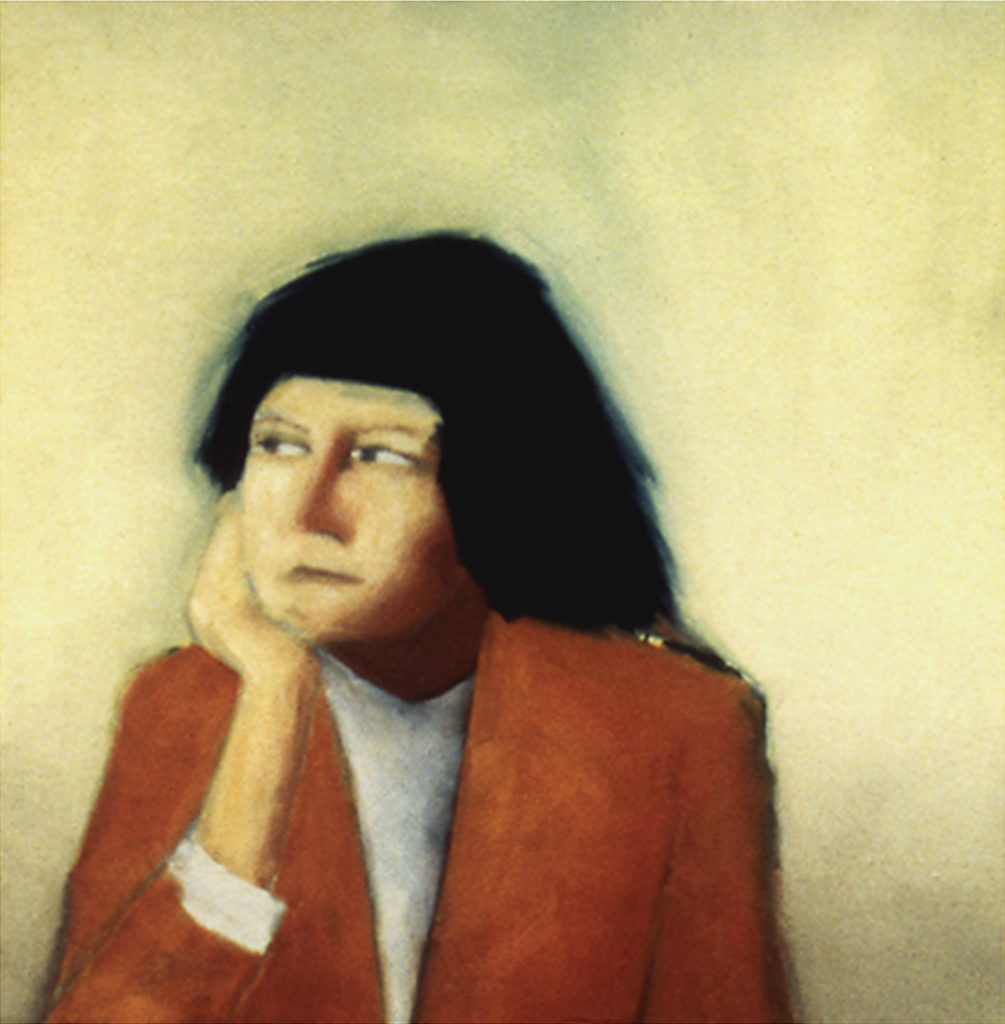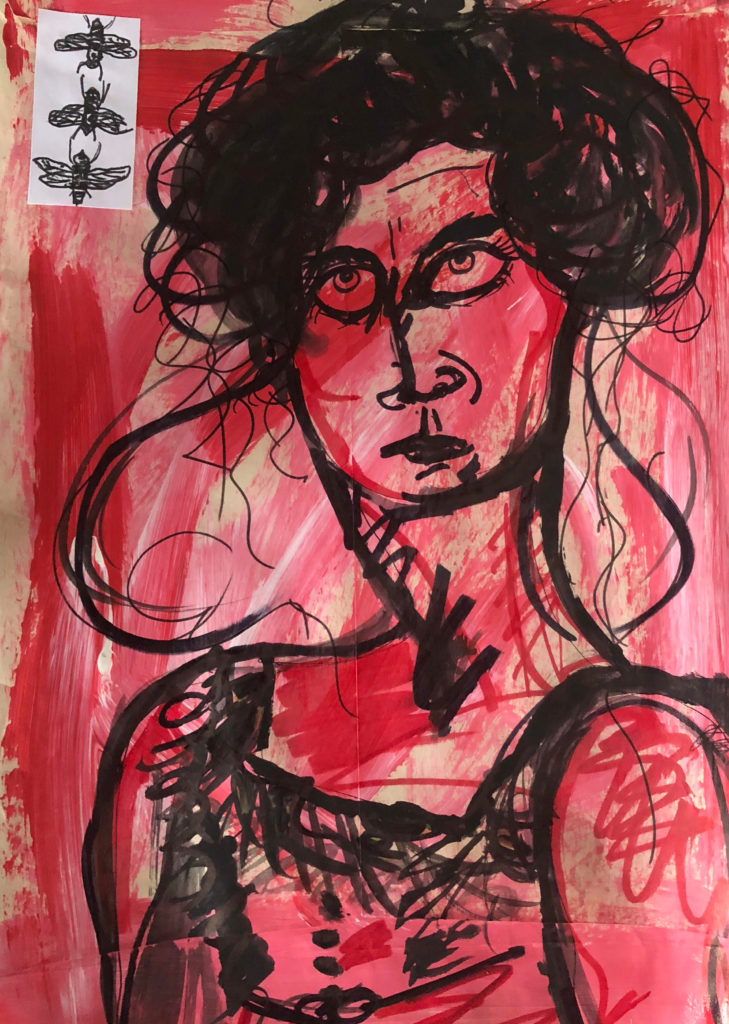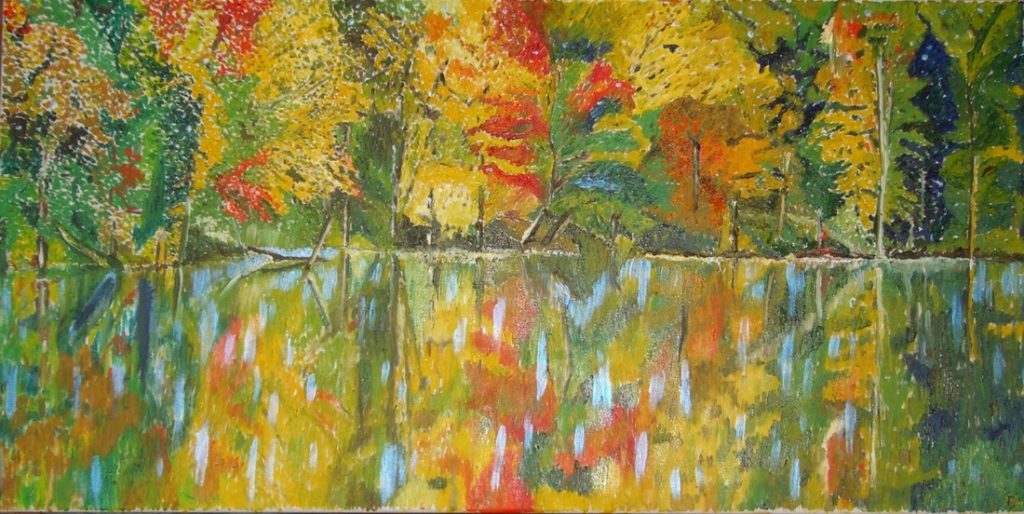Letter from Inside Winter
Jannie to Sydney
27.12.20
Tonight I write to you from inside winter, its dark stillness, from fire in the grate
made by my love who understands the appetite of fire. On the hearth, seed catalogues
spill green incantations: Whorled Milkweed, Wild Bergamot, Many Flowered Aster.
Have you seen the little love letter to the world sandblasted on the High Level Bridge
walkway? dear unknown, bring it on! It was written by a pregnant teenager, part of
a community art project to keep people from jumping. How well has the spell worked?
Do you remember when she would have been called an unmarried mother?
Don’t ask a fish to describe water—the way I always begin my class on metaphor.
Today, a sudden small jarring, realizing front line workers and deployed are war words.
A weasel has moved into the old farmhouse. We saw it peeking from behind the boots—
luminously winter white, bold, deadly cute. No more mice. Weasels have
strong magic. In Japan, they are yōkai, who cause strange disturbances.
I’ve seen its tracks in the clearings you’ve made in the caragana. Delicate calligraphy:
a backbone of two dots repeated along the dragmark of tail. Was it the
weasel your motion sensor camera captured that I said looked like the prince of ghosts?
Make=Believe we’ve called this project, and it was you who put the sign for equals
between those two words. Think of all that’s balanced on that small bridge.
Work, creating, beginner’s mind, faith. dear unknown, bring it on!

Winter Caragana by Sydney Lancaster
Listen to Jannie Edwards read “Letter from Inside Winter.”
More Medicine
Sydney to Jannie
02.02.21
The Medicine in the land is beyond this moment of writing, beyond settlement,
homesteads, roads…
beyond me, in my lack of understanding
except
the visceral nature of being-in-the-place and the healing it brings.
The trees tell me things
About using the body to grow beyond
About using my damaged hands and back to heal
About time, and how it passes
The rupture
Of seed pods of
Loam rich with mushroom spores of
Coyote call in an otherwise silent evening of
Storms
Looming, rolling in
On themselves traversing
Sky dome
Erased by a wall of cloud electric
The body electric with
Anticipation
Of hands in soil, of rain, of thunder
Of Medicine.
I read that the bark of caragana makes good rope.
This is one of its medicines.
As a legume, it fixes nitrogen in the soil.
Another Medicine.
Also, the lightning spark seeds it throws everywhere are edible.
Yet another Medicine.
This is the contra-diction of the place, the home place, the not-home place.
That it is bounded in part by a plant so invasive,
So bound to the movement of people from
Elsewhere to the home
Place of
Planting feet in soil seeds in ground to make a
Shelter
Belt of trees a hedge
Hedging Bets on this place.
On believing.
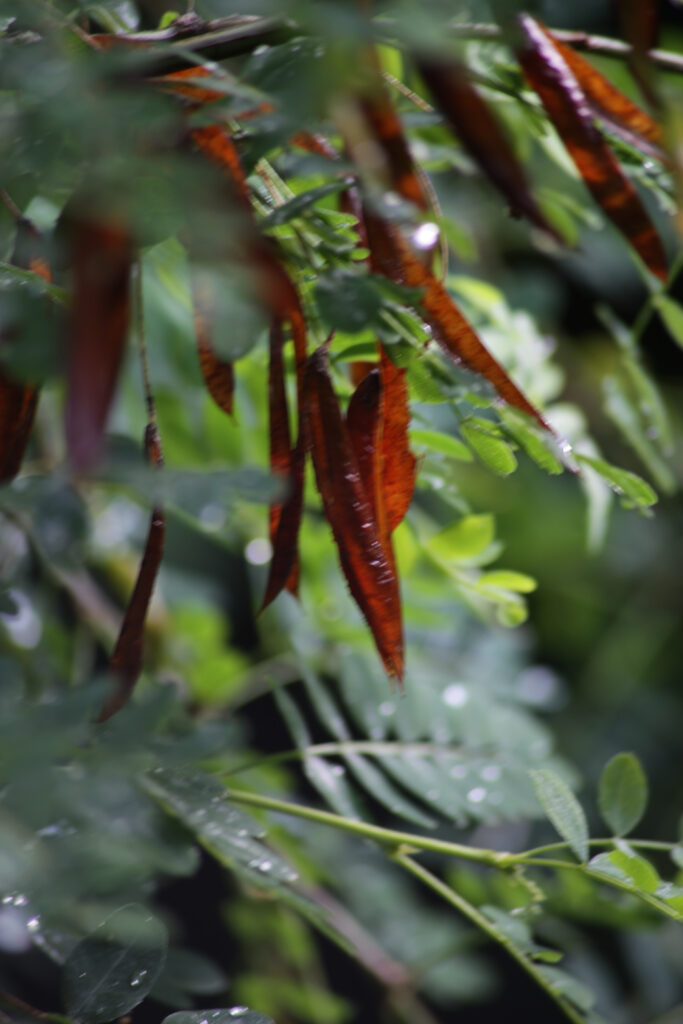
Caragana Pods by Sydney Lancaster
Listen to Sydney Lancaster read “More Medicine.”
***
About Learning Their Names
written by Jannie Edwards
Eighteen years ago, through great good fortune, my husband Mark and I came to be title holders of an off-grid five-acre settler homestead northeast of Edmonton, Alberta, near the historic Victoria Trail that hugs the North Saskatchewan River. In 2011, multi-disciplinary artist Sydney Lancaster approached us about the potential of creating art at the homestead, using whatever organic material she might find there. What she found in abundance was caragana (Siberian pea shrub), a fast-growing, invasive shelter belt brought here by Ukrainian settlers. Sydney began weaving living caragana trees to form enclosed spaces and tunnels. Within those spaces, she also created sculptures from cleared and woven deadfall, and installed motion sensor cameras to record animals and birds passing through the installation.
The “Slow Art” development of the project over the last decade has led to deeper conversations about settler colonialism, our responsibilities and complicity in this system, and how we respond to these forces through the stewardship of a small bit of the planet we love deeply. The project has been an opportunity to listen to and learn from the other-than-human presences of the place and to explore the connections between place, history, ownership, stewardship, and displacement. Through this process, we have come to see the caragana as a metaphor for both human resilience and the lasting impacts of settler-colonialism here. These connections continue to fuel our archival and geological research, and our exploration of the potential for art and writing to express these relationships. We have called the project Make=Believe, the equal sign evoking belief, hope, imagination, and effort in equal measure—a symbol to acknowledge the belief and sheer physical labour required of Indigenous people, Métis, and settlers alike in making a living on this land.
Over the last ten years, this project has been enriched by our collaborative exploration of the history of place, informed by archival and community-based research of how the land was surveyed and how the presence and history of Indigenous peoples were largely erased in the process. The art that has emerged includes an ongoing exchange of poetic letters, Learning Their Names: Letters from the Home Place, between the two of us. We have discussed plans for Sydney to create an art book of this work and the creation of a videotaped performance enriched by images of the installation.
In the summer of 2021, Sydney created and documented an endurance performance in which she ceremonially dug up a caragana tree, formed its trunk and branches into a spike, then planted the spike in earth: an evocation of a “Witness Mound” used by the Dominion Land Survey to indicate homestead borders. She then “unmade” the spike and transformed the site into a garden bed, to be planted in the future with traditional Indigenous medicinal plants local to the area—a ritual of community-building Reconciliation to be shared with, and informed by, the wisdom of Indigenous artists and knowledge keepers.
***
About Jannie Edwards & Sydney Lancaster
 An immigrant to Canada, Jannie Edwards writes from her chosen city of Edmonton, Alberta, amiskwacîwâskahikan (ᐊᒥᐢᑿᒌᐚᐢᑲᐦᐃᑲᐣ). She has published three collections of poetry: Falling Blues (2010), Blood Opera: The Raven Tango Poems (2006), and The Possibilities of Thirst (1997). She has collaborated on many mentorships and multidisciplinary artistic projects that include videopoems (“Engrams” and “adrift”), theatrical adaptations of her Blood Opera: The Raven Tango Poems, and a community art project that realized poems sandblasted into sidewalks on the High Level Bridge and city neighbourhoods.
An immigrant to Canada, Jannie Edwards writes from her chosen city of Edmonton, Alberta, amiskwacîwâskahikan (ᐊᒥᐢᑿᒌᐚᐢᑲᐦᐃᑲᐣ). She has published three collections of poetry: Falling Blues (2010), Blood Opera: The Raven Tango Poems (2006), and The Possibilities of Thirst (1997). She has collaborated on many mentorships and multidisciplinary artistic projects that include videopoems (“Engrams” and “adrift”), theatrical adaptations of her Blood Opera: The Raven Tango Poems, and a community art project that realized poems sandblasted into sidewalks on the High Level Bridge and city neighbourhoods.
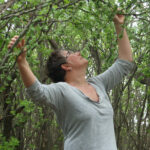 Sydney Lancaster is a Prairie-born multidisciplinary artist and writer of settler stock, an uninvited guest on the traditional Indigenous territories encompassed by Treaty 6 and Métis Nation Region 4. Her work has been presented in Alberta, BC, Ontario, Quebec, Newfoundland, and the US. Her practice considers the relationships between place, objects, memory, knowledge, and time through site-specific installation & sculpture, video and audio works, printmaking, and photography. Sydney is currently completing a Masters of Fine Art at Grenfell Campus, Memorial University of Newfoundland and Labrador.
Sydney Lancaster is a Prairie-born multidisciplinary artist and writer of settler stock, an uninvited guest on the traditional Indigenous territories encompassed by Treaty 6 and Métis Nation Region 4. Her work has been presented in Alberta, BC, Ontario, Quebec, Newfoundland, and the US. Her practice considers the relationships between place, objects, memory, knowledge, and time through site-specific installation & sculpture, video and audio works, printmaking, and photography. Sydney is currently completing a Masters of Fine Art at Grenfell Campus, Memorial University of Newfoundland and Labrador.

